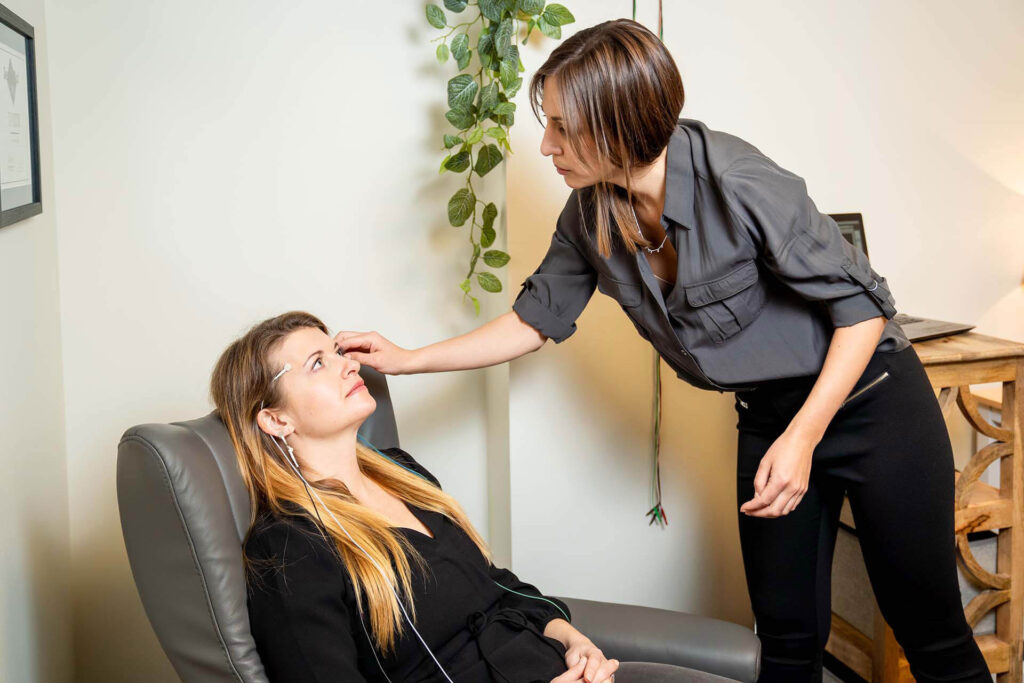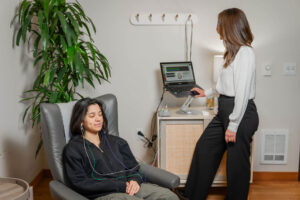Introduction:
In the dynamic landscape of modern healthcare, NeuroLogic Seattle stands at the forefront, offering transformative neurofeedback therapies that transcend traditional treatment approaches. This comprehensive guide explores the multifaceted world of neurofeedback and its application in addressing various mental and neurological conditions. Dive into the realms of personalized healing and discover how NeuroLogic Seattle is redefining well-being.
Understanding Neurofeedback – A Window into Brain Regulation
Neurofeedback, a powerful therapeutic technique, operates on the principle of real-time monitoring and feedback to regulate brain function. At NeuroLogic Seattle, this method becomes a personalized journey for patients seeking relief from various conditions.
1. Attention-Deficit/Hyperactivity Disorder (ADHD):
- Neurofeedback at NeuroLogic Seattle has shown promising results in alleviating symptoms of ADHD. Many studies now show children undergoing neurofeedback experience significant improvements in attention and behavior.
- Meet Emily, a 10-year-old diagnosed with ADHD. Before neurofeedback, she struggled with school, facing challenges in maintaining focus and completing tasks. Behavioral issues were evident, affecting her relationships with peers. After a tailored neurofeedback program, Emily’s parents observed a remarkable transformation. Her focus improved, academic performance soared, and behavioral challenges subsided. Emily’s journey reflects the impactful changes neurofeedback can bring to children and adolescents navigating the complexities of ADHD.
2. Anxiety Disorders:
- The application of neurofeedback at NeuroLogic Seattle addresses anxiety disorders.
- John, a 35-year-old professional, sought help for his debilitating anxiety. Before neurofeedback, John grappled with constant worry, impacting both his personal and professional life. Sleepless nights and an inability to concentrate became the norm. Through a series of neurofeedback sessions at NeuroLogic Seattle, John experienced a significant decrease in generalized anxiety. His newfound calmness allowed him to approach work challenges with renewed confidence. John’s story illustrates how neurofeedback can be a transformative ally in the battle against anxiety.
3. Post-Traumatic Stress Disorder (PTSD):
- Neurofeedback emerges as a valuable ally in the treatment of PTSD.
- Meet Rachel, a survivor of a traumatic event that left lasting emotional scars. Before discovering neurofeedback, Rachel grappled with intrusive memories and heightened stress responses. Simple triggers would evoke overwhelming anxiety. Through a tailored neurofeedback program at NeuroLogic Seattle, Rachel experienced a significant reduction in PTSD symptoms. [image: supportive neurofeedback treatment]. The intrusive memories lessened, and her overall emotional well-being improved, showcasing the potential of neurofeedback in addressing trauma beyond military contexts.
Expanding the Horizon – Neurofeedback Beyond Mental Health
Neurofeedback’s influence at NeuroLogic Seattle reaches beyond mental health, offering hope and relief for an array of conditions.
1. Migraines:
- NeuroLogic Seattle extends its reach to individuals grappling with migraines. Research suggests that neurofeedback may significantly reduce the frequency and intensity of migraines by modulating brainwave patterns.
- Meet Mark, a migraine sufferer burdened by frequent and intense headaches. Before discovering neurofeedback, Mark’s migraines disrupted his daily life, hindering his work and personal activities. The pain often left him incapacitated for days. Through a dedicated series of neurofeedback sessions, Mark experienced a substantial reduction in migraine frequency. [Image: Happy and relieved individual]. His journey exemplifies how neurofeedback can offer relief to those living with the debilitating impact of chronic migraines.
2. Insomnia:
- Neurofeedback plays a positive role in addressing sleep disorders. Studies indicate improvements in sleep quality and insomnia severity.
- Elizabeth, a chronic insomniac, faced nights filled with restlessness and sleeplessness. The constant struggle with insomnia affected her daily functioning and overall well-being. Turning to NeuroLogic Seattle, Elizabeth incorporated neurofeedback into her sleep routine, resulting in falling asleep faster and enjoying more restful nights. [Image: Restful night’s sleep]. Her experience underscores how neurofeedback can bring relief to those battling the challenges of insomnia.
Tailored Healing – Navigating Neurofeedback at NeuroLogic Seattle
NeuroLogic Seattle is dedicated to fostering personalized approaches, ensuring that each patient’s unique journey to well-being is supported and guided.
1. Continuous Care for Diverse Conditions:
- At NeuroLogic Seattle, the commitment to patient-centric care remains unwavering. The practice tailors neurofeedback programs to address the unique needs of each individual, ensuring a holistic approach to well-being.
- Personalized success stories like Emily’s, John’s, Rachel’s, Mark’s, and Elizabeth’s illustrate the practice’s dedication to improving lives through neurofeedback. These vignettes bring to light the diverse ways in which neurofeedback at NeuroLogic Seattle serves as a beacon of hope for those seeking transformative healing.
NeuroLogic Seattle is not just a medical practice; it is a sanctuary for those seeking a transformative journey toward wellness. Through neurofeedback, the practice brings forth a personalized and comprehensive approach to address an array of conditions. As the horizon of possibilities expands, NeuroLogic Seattle stands as a beacon of hope, guiding individuals toward a life enriched with vitality and mental clarity.
Note: Names have been changed to protect patient privacy in compliance with HIPAA.




